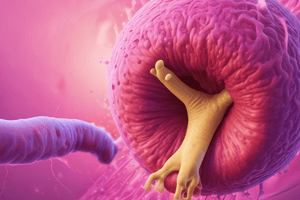Podcast
Questions and Answers
What is the primary focus of treatment for infectious mononucleosis?
What is the primary focus of treatment for infectious mononucleosis?
- Symptom management (correct)
- Immediate surgical intervention
- Long-term antiviral therapy
- Completely eradicating the virus
Which laboratory test is commonly used to confirm EBV infection?
Which laboratory test is commonly used to confirm EBV infection?
- Monospot blood test (correct)
- Throat culture
- Liver function test
- Complete blood count (CBC)
What should be avoided in individuals recovering from EBV mono due to the risk of splenic rupture?
What should be avoided in individuals recovering from EBV mono due to the risk of splenic rupture?
- High altitude travel
- Cold temperature exposure
- Contact sports (correct)
- Strenuous exercise
Which of the following is a documented complication of EBV infection?
Which of the following is a documented complication of EBV infection?
In what circumstances might antiviral therapy be considered for EBV infection?
In what circumstances might antiviral therapy be considered for EBV infection?
Flashcards are hidden until you start studying
Study Notes
Diagnosis and Confirmation of EBV Infection
- Diagnosis relies on clinical presentation.
- Monospot blood test is a common, rapid diagnostic tool.
- Complete blood count (CBC) often shows increased bands, neutrophils, lymphocytes, reactive lymphocytes, and thrombocytopenia.
Treatment and Management of Infectious Mononucleosis (Mono)
- Treatment primarily focuses on managing symptoms.
- Analgesics are used to alleviate fever and muscle pain (myalgias).
- Short-term oral glucocorticoids might be beneficial for severely enlarged tonsils or airway obstruction concerns.
- Antivirals are generally unnecessary, as symptoms stem from the immune response rather than viral replication; however they may be considered in cases of chronic EBV.
- Contact sports should be avoided to prevent splenic rupture, resuming only after splenomegaly resolves (typically within weeks).
- Fatigue is a common symptom that may persist for 2-6 months.
Complications of EBV Infection
- Splenic rupture is a potential complication.
- EBV infection increases the risk of B-cell lymphomas (Burkitt lymphoma, classical Hodgkin lymphoma) and certain cancers (gastric and nasopharyngeal).
- Hemolytic anemia, thrombocytopenia, meningitis, myelitis, and Guillain-Barré syndrome are possible complications of EBV and CMV co-infections.
- Reactivation can occur in immunosuppressed states.
Cytomegalovirus (CMV) Infection
- Prior CMV infection leads to latent viral persistence in the body.
- Latent CMV resides in all solid organs and can reactivate following transplantation and subsequent immunosuppressive therapy.
Studying That Suits You
Use AI to generate personalized quizzes and flashcards to suit your learning preferences.




